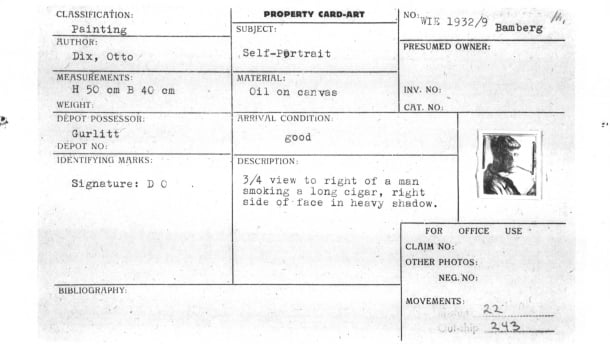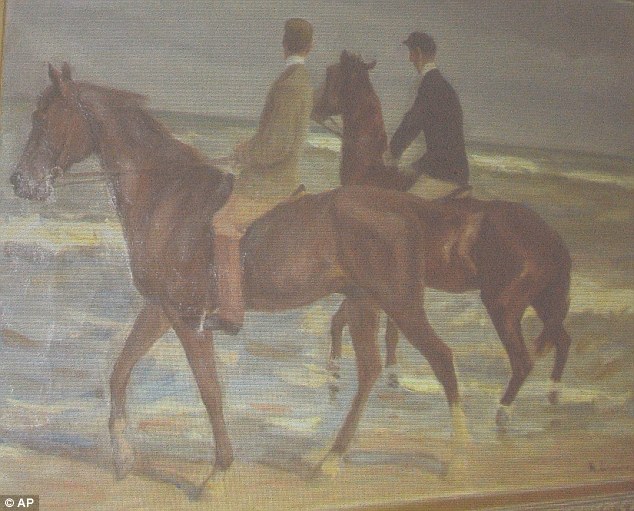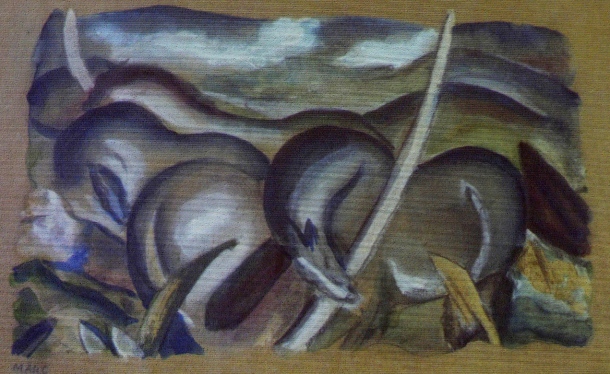Der Spiegel reports today (link in German) about how German museums are joining the chorus of frustration about the lack of information about the Hildebrand and Cornelius Gurlitt collection find. From this perspective, this development is not a surprise. I was speaking to an international law class last night at Sarah Lawrence College, and one of the students asked me what the reaction in Germany would be. My feeling was that sooner rather than later, the German museum community, and likely the federal government, will push for a forward-looking solution. Present-day Germany takes questions about the Holocaust quite seriously, and for this collection to have turned up in Germany is sparking an embarrassment that could lead to more decisive action. The problem right now seems to be that everyone is waiting for someone else to make the first move.
German Museums Join in Demands for More Information About Gurlitt; Links to the Amber Room Theorized; Dix Painting Was Not Unknown
Topics: Jeu de Paume, unbekannte Meisterwerke, February 13 1945, FAZ, Focus, Hildebrand Gurlitt, Dresden firebombing, Max Fisher, Cornelius Gurlitt, S. Lane Faison, Linz Führermuseum, Munich Central Collecting Point, Monopol, Wiesbaden Collecting Point, Dresden, HARP, Reinhard Nemetz, Max Liebermann, WWII, Monuments Men, Gurlitt Collection, Max Beckmann, Otto Dix, Degenerate Art: The Fate of the Avant-Garde in Naz, Auktionshaus Lempertz, Entartete Kunst, Fine Arts and Archives Program, Nazis, Marc Chagall, Organisation Todt, Paul Klee, Entdeckung verschollener Kunst, beschlagnahmte Bilder, Dresdner Bank, Belvedere, Fritz Todt, Holocaust Art Project, Hamburg Kunstverein, MFAA, Roberts Commission, Angela Merkel, Restitution, Wien, Monuments Fine Arts and Archives, Selbstporträt, World War II, degenerate art, Erben, Raubkunst-Bildern, Portrait of Wally, Washi, Löwenbändiger, Austria, Franz Marc, Oskar Kokoschka, Washington Principles, Ernst Ludwig Kirchner, München, Pablo Picasso, Dr. Herman Voss, Museums, Kristallnacht, Riders on the Beach, Hans Posse, Nazi Raubkunst, Vienna, Alfred Weidinger, Henri Matisse, Self Portrait, Emil Nolde
Focus Turns to Hildebrand Gurlitt’s Postwar Interrogation; Cornelius Gurlitt’s Whereabouts. Belvedere Official Questions Whether Collection Was Really a Secret
Topics: Jeu de Paume, unbekannte Meisterwerke, February 13 1945, FAZ, Focus, Hildebrand Gurlitt, Dresden firebombing, Max Fisher, Cornelius Gurlitt, S. Lane Faison, Linz Führermuseum, Munich Central Collecting Point, Monopol, Wiesbaden Collecting Point, Dresden, HARP, Reinhard Nemetz, Max Liebermann, WWII, Monuments Men, Gurlitt Collection, Max Beckmann, Degenerate Art: The Fate of the Avant-Garde in Naz, Auktionshaus Lempertz, Entartete Kunst, Fine Arts and Archives Program, Nazis, Marc Chagall, Organisation Todt, Paul Klee, Entdeckung verschollener Kunst, beschlagnahmte Bilder, Dresdner Bank, Belvedere, Fritz Todt, Holocaust Art Project, Hamburg Kunstverein, MFAA, Roberts Commission, Angela Merkel, Restitution, Wien, Monuments Fine Arts and Archives, World War II, degenerate art, Erben, Raubkunst-Bildern, Portrait of Wally, Washi, Löwenbändiger, Austria, Franz Marc, Oskar Kokoschka, Washington Principles, Ernst Ludwig Kirchner, München, Pablo Picasso, Dr. Herman Voss, Kristallnacht, Riders on the Beach, Hans Posse, Nazi Raubkunst, Vienna, Alfred Weidinger, Henri Matisse, Emil Nolde
Merkel Hints at Putting Gurlitt Lists Online, Calls for Special Tribunal Are Made
Catherine Hickley reports from Berlin that the government of Chancellor Angela Merkel is looking into ways to put lists and/or photographs online concerning the Cornelius Gurlitt seizure of roughly 1,400 paintings with connections to Nazi looting. This followed heavy complaints in the first days of the revelation, that the government had failed to identify what has been found. The biggest question remains why this remained a secret for roughly two years since the discovery. Merkel’s government claimed yesterday it learned of the find only in the last few months.
Topics: Stephanie Barron, Jeu de Paume, unbekannte Meisterwerke, Focus, Hildebrand Gurlitt, Theo Hermsen, S. Lane Faison, Linz Führermuseum, Munich Central Collecting Point, Wiesbaden Collecting Point, HARP, Max Liebermann, WWII, Monuments Men, Alt Aussee, Gurlitt Collection, Max Beckmann, Association for Research into Crimes Against Art, Monuments, Degenerate Art: The Fate of the Avant-Garde in Naz, Albrecht Dürer, Auktionshaus Lempertz, Entartete Kunst, Fine Arts and Archives Program, Nazis, Marc Chagall, Paul Klee, Entdeckung verschollener Kunst, beschlagnahmte Bilder, Holocaust Art Project, Judge Arthur Tompkins, Roberts Commission, Angela Merkel, Restitution, 1939 Galerie Fischer auction, World War II, degenerate art, Capt. Doubinsky, Los Angeles County Musuem of Art, Erben, Raubkunst-Bildern, Altmann v. Republic of Austria, Portrait of Wally, Löwenbändiger, Marc Masurovsky, Franz Marc, Oskar Kokoschka, Ernst Ludwig Kirchner, München, Pablo Picasso, ARCA, Lawyers' Committee for Cultural Heritage Preservat, Nazi Raubkunst, Henri Matisse, Emil Nolde
Paintings Targeted by the Nazis Found in Munich, Could be Biggest Discovery Since the War. What Now?
The German magazine Focus broke a story over the weekend that could be the biggest restitution news since Portrait of Wally or Altmann v. Republic of Austria: roughly 1,400 paintings were found in a Munich apartment that may have been seized, looted, or sold bought under duress by the Nazis in the 1930s as part of their drive to purge what they called “degenerate”—but extremely lucrative—art (the Focus coverage is extensive and excellent, though fair warning, in German). The paintings, which were apparently recovered not recently, but in 2011 as part of a customs seizure related to a currency declaration of all things, include works by Pablo Picasso, Henri Matisse, Marc Chagall, Emil Nolde, Franz Marc, Max Beckmann, Paul Klee, Oskar Kokoschka, Ernst Ludwig Kirchner, Max Liebermann and Albrecht Dürer, from collections traced back to Paul Rosenberg and others who had to abandon their property during the war, all long thought lost to the destruction of the war. They are valued in excess of 1 billion euros.
Topics: Stephanie Barron, unbekannte Meisterwerke, Focus, Hildebrand Gurlitt, S. Lane Faison, Linz Führermuseum, Max Liebermann, WWII, Monuments Men, Alt Aussee, Gurlitt Collection, Max Beckmann, Degenerate Art: The Fate of the Avant-Garde in Naz, Albrecht Dürer, Auktionshaus Lempertz, Entartete Kunst, Nazis, Marc Chagall, Paul Klee, Entdeckung verschollener Kunst, beschlagnahmte Bilder, Restitution, 1939 Galerie Fischer auction, World War II, degenerate art, Los Angeles County Musuem of Art, Erben, Raubkunst-Bildern, Altmann v. Republic of Austria, Portrait of Wally, Löwenbändiger, Franz Marc, Oskar Kokoschka, Ernst Ludwig Kirchner, München, Pablo Picasso, Lawyers' Committee for Cultural Heritage Preservat, Nazi Raubkunst, Henri Matisse, Emil Nolde
Does The Art World Have a Russia Problem?
Several overlapping issues in recent months have turned what was an awkward elephant in the room into a major issue facing the art world today. Namely: the increasing role that Russia is playing in restitution, loans and exhibition controversies has aggregated to Vladimir Putin an extraordinary amount of influence over these major international legal issues. Combined with the Edward Snowden controversy (and the bizarre story of Putin’s theft of Robert Kraft’s New England Patriots Super Bowl ring), it seems quite clear that Putin enjoys that spotlight. That has not proven to be good news for the art world.
Topics: Nazi Germany, Russia, Germany, WWII, Foreign Sovereign Immunities Act, Red Army, Edward Snowden, FSIA, Restitution, New England Patriots, Super Bowl, Vladimir Putin, Robert Kraft, Soviet Union
DC Circuit Reinstates All Claims that Were Dismissed in Herzog Case Against Hungary-UPDATED
The DC Circuit Court of Appeals has reinstated the entire set of claims brought by the Herzog heirs against the Hungarian National Gallery, the Budapest Museum of Fine Arts, the Museum of Applied Arts, and the Budapest University of Technology and Economics. The appellate decision focuses on the claim that an agreement was reached after WWII to hold the paintings for their owners, not the claims relating to their wartime fate. In so doing, the court pushed to the side a whole range of defenses for sovereign defendants that have been increasingly successful. The court also reinstated claims to ownership of 11 works whose title was previously litigated, in an opinion that sets a low bar for collateral attacks on foreign judgments.
Topics: David de Csepel, Nazi Germany, Angela Maria Herzog, Hungary, WWII, Viktor Orban, res judicata, Julia Alice Herzog, Budapest University of Technology and Economics, Baron Mor Lipot Herzog, Hungarian National Gallery, Jori Finkel, Budapest Museum of Fine Arts, Adolf Eichmann, FSIA, expropriation exception”, Restitution, 28 U.S.C. § 1605(a)(2), 28 U.S.C. § 1605(a)(3), World War II, Foreign Sovereign Immunities, Alison Frankel, András Herzog, Janos Lazar, Museum of Applied Arts





